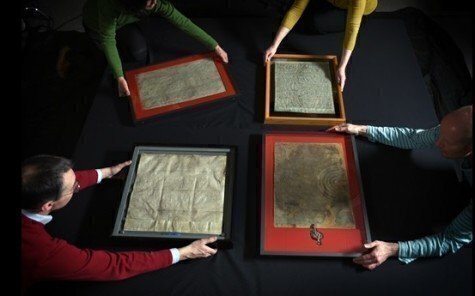It’s the big 8-0-0 for Great Britain’s Magna Carta, the mother of all constitution-related documents!
 On June 15, 1215, in a field at Runnymede, King John agree to place the royal seal to Magna Carta. The King had been confronted by 40 barons, who issued their demands to avoid a civil war. (Pope Innocent III soon nullified the agreement, and war broke out anyway within England.)
On June 15, 1215, in a field at Runnymede, King John agree to place the royal seal to Magna Carta. The King had been confronted by 40 barons, who issued their demands to avoid a civil war. (Pope Innocent III soon nullified the agreement, and war broke out anyway within England.)
The Magna Carta established the concept that the King was not above the law of the realm. It also led to some familiar concepts in the U.S. Constitution, such as due process.
“No freeman shall be taken, imprisoned, disseised, outlawed, banished, or in any way destroyed, nor will We proceed against or prosecute him, except by the lawful judgment of his peers or by the law of the land,” the Magna Carta read.
The 800-year Magna Carta anniversary celebrations started in February and they will continue through 2015.
The British Library started a special exhibition in March that paired its two Magna Carta copies from 1215 with two of America’s founding documents: the Bill of Rights and the Declaration of Independence. The British Library has Thomas Jefferson’s handwritten copy of the Declaration and one of 12 original copies of the Bill of Rights at the exhibition, called Magna Carta: Law, Liberty, Legacy, which is set to run to September 1, 2015.
The Declaration of Independence and the U.S. Constitution, including the Bill of Rights, were inspired by basic rights and concepts first articulated in the Magna Carta.
In addition to due process, the Magna Carta expressed the concept of higher law, or the law of the land, which meant that not even the king, or a legislature, was above the law.
While the Magna Carta's birthday is a huge deal in the United Kingdom, with Queen Elizabeth involved in the ceremonies, not all English legal experts are fans of the document.
Lord Sumption, a member of the U.K.'s Supreme Court and a medieval historian, has called the Magna Carta "turgid," and very limited in how it affected people's lives.






